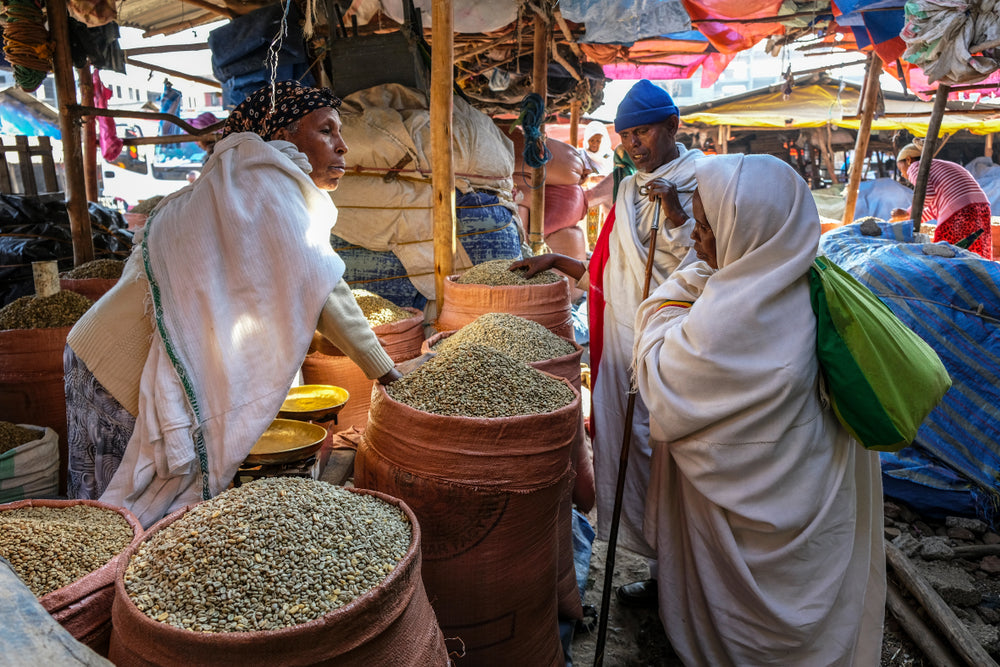Your Cart is Empty
Menu


The History of Coffee in East Africa
January 19, 2024 3 min read
The History of Coffee in East Africa
The Aromatic Saga: Unveiling the History of Coffee in East Africa
Across the sun-drenched plains and verdant mountains of East Africa, the story of coffee unfolds like a fragrant myth. A tale steeped in ancient legend, colonial legacies, and the unyielding spirit of independent farmers, it's a narrative intertwined with the region's history, culture, and economic lifeblood.
Our journey begins in the Ethiopian highlands, where legend whispers of a 9th-century goat herder named Kaldi. His curious flock, energized by the berries of a peculiar tree, inspired him to share his discovery with the local monastery. Monks brewed a concoction, savoring its invigorating effect during long prayer sessions. Thus, the legend of coffee took root, eventually blossoming into a vibrant trade route traversing the Arabian Peninsula and beyond.
By the 15th century, coffee had become a cherished beverage in Yemen, its cultivation carefully guarded. Yet, the beans couldn't resist the wind of change. Somali merchants, traversing the Red Sea, smuggled coffee across to their homeland, eventually introducing it to Ethiopia's neighbors.
Kenya, once home to wild varieties of the Coffea arabica tree, embraced coffee cultivation much later. In the late 19th century, European missionaries, and colonists, recognizing the region's ideal growing conditions, planted the seeds of a future industry. However, the initial beneficiaries were not the native Kenyans, but European settlers who thrived under a colonial system that marginalized indigenous farmers.
Despite these inequities, Kenyans gradually carved their own space in the coffee world. Traditional Kikuyu farmers developed unique processing methods like the "sun-drying" technique, creating distinct flavors that set Kenyan coffee apart. By the mid-20th century, the Mau Mau Uprising challenged colonial rule, paving the way for independent cultivation and cooperatives that empowered local farmers.
Tanzania, too, boasts a rich coffee history. Arab traders introduced the crop in the 18th century, and French missionaries later nurtured its growth. Tanzanian coffee, characterized by its mild acidity and fruity notes, gained recognition for its unique character. Today, smallholder farmers form the backbone of the industry, their cooperative endeavors ensuring fairer practices and sustainable livelihoods.
Rwanda's coffee tale is one of resilience and rebirth. Ravaged by civil war in the 1990s, the coffee industry nearly crumbled. But the indomitable spirit of Rwandan farmers revived the sector. Focusing on high-quality Arabica beans and fair-trade practices, Rwanda emerged as a leader in specialty coffee production, its beans prized for their intense aromas and smooth finishes.
Uganda, blessed with fertile volcanic soil, cultivated coffee commercially since the early 20th century. Initially dominated by large plantations, the industry shifted towards smallholder farming after independence. Ugandan coffee, known for its strong body and chocolatey undertones, continues to evolve, with farmers experimenting with new processing techniques and varieties.
East African coffee isn't just about economic sustenance; it's a social fabric woven into the region's tapestry. From the bustling coffee ceremonies of Ethiopia, where friends and family gather over steaming cups, to the casual "kibanda" stalls of Kenya, where instant coffee fuels conversations, the aroma of brewing beans permeates daily life.
However, the history of East African coffee also carries scars. Colonial exploitation, unfair trade practices, and volatile market fluctuations have presented continuous challenges. Despite these hurdles, the region's farmers remain the unsung heroes. Their dedication, innovation, and resilience have shaped a thriving industry that not only sustains livelihoods but also fuels cultural connections and national pride.
The future of East African coffee is brimming with possibilities. Climate change adaptation, fair-trade initiatives, and diversification into specialty coffee markets offer promising avenues for sustainable growth. Collaborative efforts between governments, NGOs, and private players are crucial to empower farmers, improve processing and infrastructure, and promote quality brands.
As we savor the final sip of this aromatic narrative, let us remember the journey: from ancient legends to colonial legacies, from the hands of resilient farmers to our steaming cups. East African coffee is more than just a beverage; it's a testament to human spirit, cultural vibrancy, and the endless pursuit of a perfect cup.
Ethiopian Coffee Farmers and Climate Change
Rwandan Coffee: A Crop of Hope